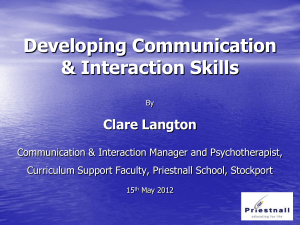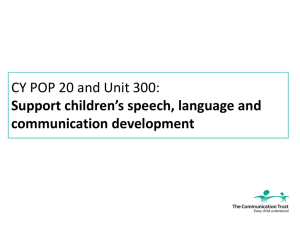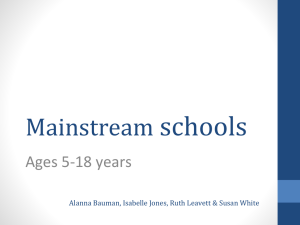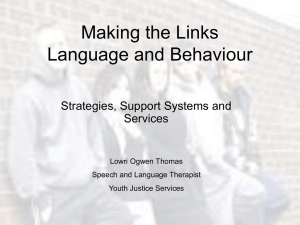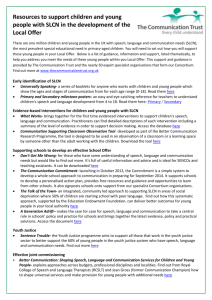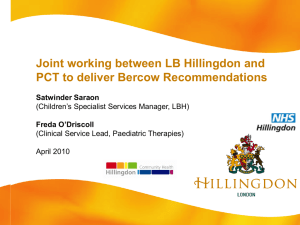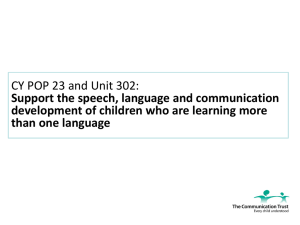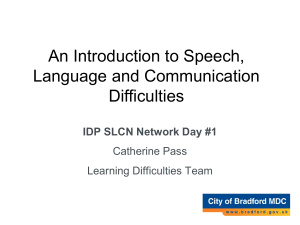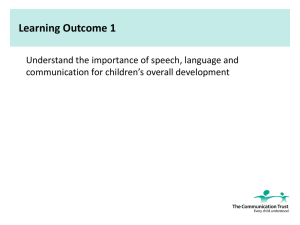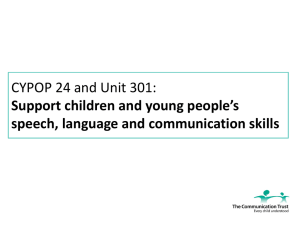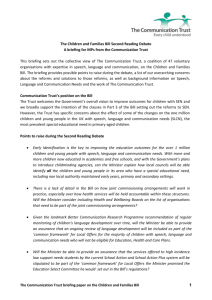Assessment guidelines
advertisement
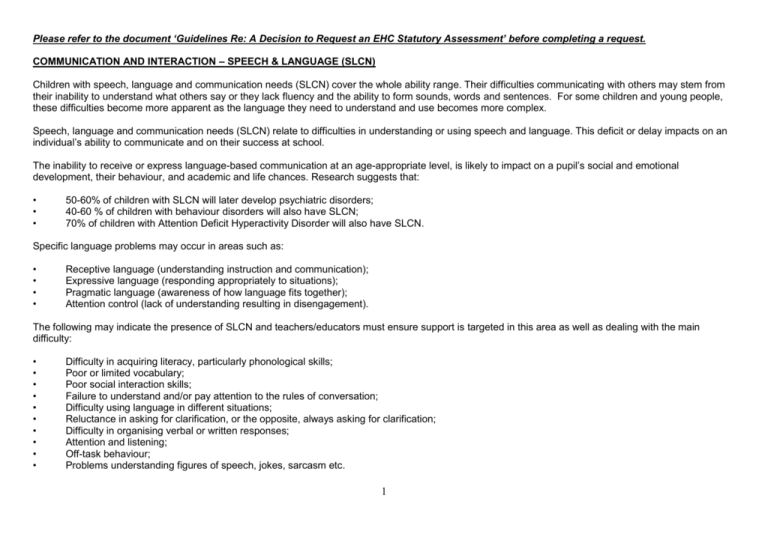
Please refer to the document ‘Guidelines Re: A Decision to Request an EHC Statutory Assessment’ before completing a request. COMMUNICATION AND INTERACTION – SPEECH & LANGUAGE (SLCN) Children with speech, language and communication needs (SLCN) cover the whole ability range. Their difficulties communicating with others may stem from their inability to understand what others say or they lack fluency and the ability to form sounds, words and sentences. For some children and young people, these difficulties become more apparent as the language they need to understand and use becomes more complex. Speech, language and communication needs (SLCN) relate to difficulties in understanding or using speech and language. This deficit or delay impacts on an individual’s ability to communicate and on their success at school. The inability to receive or express language-based communication at an age-appropriate level, is likely to impact on a pupil’s social and emotional development, their behaviour, and academic and life chances. Research suggests that: • • • 50-60% of children with SLCN will later develop psychiatric disorders; 40-60 % of children with behaviour disorders will also have SLCN; 70% of children with Attention Deficit Hyperactivity Disorder will also have SLCN. Specific language problems may occur in areas such as: • • • • Receptive language (understanding instruction and communication); Expressive language (responding appropriately to situations); Pragmatic language (awareness of how language fits together); Attention control (lack of understanding resulting in disengagement). The following may indicate the presence of SLCN and teachers/educators must ensure support is targeted in this area as well as dealing with the main difficulty: • • • • • • • • • • Difficulty in acquiring literacy, particularly phonological skills; Poor or limited vocabulary; Poor social interaction skills; Failure to understand and/or pay attention to the rules of conversation; Difficulty using language in different situations; Reluctance in asking for clarification, or the opposite, always asking for clarification; Difficulty in organising verbal or written responses; Attention and listening; Off-task behaviour; Problems understanding figures of speech, jokes, sarcasm etc. 1 In general children with severe SLCN would be considered for statutory assessment. However where there is clear progress in response to relevant intervention on the part of the school and supported by a Speech and Language assessment, a statutory assessment would not be deemed appropriate. Key Stage SLT Attainments Abilities Progress/Attainment Evidence of involvement of all relevant agencies where the child/young person (YP) continues to make little or no progress despite appropriate and evaluated support. Foundation Key Stage 1 Key Stage 2 Language difficulties interfere with their daily functions and academic progress. Performance on standardised language test is significantly below age-appropriate levels Key Stage 3 Key Stage 4 Post 16 Their language difficulties cannot be explained in terms of other factors such as hearing loss, general developmental delay, autism, EAL or physical difficulty in speaking. Those who are not yet speaking when they start school; language difficulties pose a barrier to the acquisition of appropriate social interaction skills. Difficulties processing auditory information, inference and sequencing. Speech may be mostly unclear and probably unintelligible to nonfamiliar adults and peers when out of context. Documentation Required For some children their SLCN may be resolved by the time they enter formal education (age 5), following intensive intervention. Speech and Language therapy involvement over a period of time with possible attendance at Cardinal Road Workshop. For some children there will be a significant impact on interaction skills and behaviour Records of action taken by the school, early years setting or college, including the use of delegated funding (£6K maximum). Progress in literacy will be slow even with intensive support, with very low attainments in other educational areas as well. Evidence of school, together with relevant specialists, having considered a range of informed and reasoned effective teaching approaches, appropriate equipment, strategies and interventions in order to support the child’s/YP’s progress. Outcomes that are achievable and with relevant review dates. Progress in all areas of learning is generally very low where both receptive and expressive skills are affected. 2 Key Stage SLT Attainments Abilities Progress/Attainment Child who is selectively mute, please refer to the Social, Emotional and Mental Health criteria. Documentation Required Evidence of how support has been adapted or replaced depending on how effective it has been in achieving the expected outcomes. Evidence of involvement of child’s parent or YP Unable to use language to function generally in all settings. Difficulties intensify as language becomes more complex and abstract, especially at secondary level. 3
